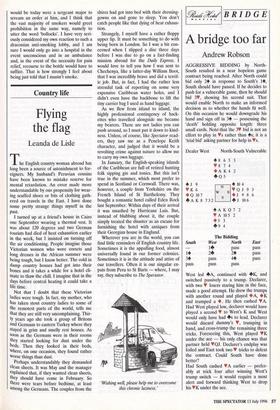BRIDGE
A bridge too far
Andrew Robson
AGGRESSIVE BIDDING by North- South resulted in a near hopeless game contract being reached. After North could bid only 24 in response to South's 14, South should have passed. If he decides to push for a vulnerable game, then he should bid 3V, showing his second suit. That would enable North to make an informed decision as to whether the hands fit well. On this occasion he would downgrade his hand and sign off in 34 — possessing the `death' holding opposite length: three small cards. Noteithat the 3V bid is not an effort to play in Vs rather than 4s; it is a `trial bid' asking partner for help in Vs.
Dealer West North-South Vulnerable South West 14 14 24 34 pass pass pass North East pass pass 24 pass
44 pass
pass The Bidding West led 4A, continued with 4K, and switched passively to a trump. Declarer, with two V losers staring him in the face, made a good attempt. He drew the trumps with another round and played ♦A, ♦K and trumped a ♦. He then cashed VA. Had West played low, declarer would have played a second. V to West's K and West would only have had 4s to lead. Declarer would discard dummy's V, trumping in hand, and cross-trump the remaining three tricks. Foreseeing this, West played ♦K under the ace — his only chance was that partner held •QJ. Declarer's endplay was foiled and East took two V tricks to defeat the contract. Could South have done better?
Had South cashed ♦A earlier — prefer- ably at trick four after winning West's trump switch — it would require a most alert and forward thinking West to drop his VK under the ace.


































































 Previous page
Previous page